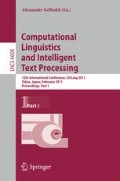Abstract
It is very likely that, at least once in their lifetime, everyone has answered a multiple-choice test. Multiple-choice tests are considered an effective technique for knowledge assessment, requiring a short response time and with the possibility of covering a broad set of topics. Nevertheless, when it comes to their creation, it can be a time-consuming and labour-intensive task. Here, the generation of multiple-choice tests aided by computer can reduce these drawbacks: to the human assessor is attributed the final task of approving or rejecting the generated test items, depending on their quality.
In this paper we present The-Mentor, a system that employs a fully automatic approach to generate multiple-choice tests. In a first offline step, a set of lexico-syntactic patterns are bootstrapped by using several question/answer seed pairs and leveraging the redundancy of the Web. Afterwards, in an online step, the patterns are used to select sentences in a text document from which answers can be extracted and the respective questions built. In the end, several filters are applied to discard low quality items and distractors are named entities that comply with the question category, extracted from the same text.
Access this chapter
Tax calculation will be finalised at checkout
Purchases are for personal use only
Preview
Unable to display preview. Download preview PDF.
References
Ravichandran, D., Hovy, E.: Learning surface text patterns for a question answering system. In: ACL 2002: Proceedings of the 40th Annual Meeting on Association for Computational Linguistics, pp. 41–47. Association for Computational Linguistics, Morristown (2002)
Petrov, S., Klein, D.: Improved inference for unlexicalized parsing. In: Human Language Technologies 2007: The Conference of the North American Chapter of the Association for Computational Linguistics; Proceedings of the Main Conference, pp. 404–411. Association for Computational Linguistics, Rochester (2007)
Judge, J., Cahill, A., van Genabith, J.: Questionbank: creating a corpus of parse-annotated questions. In: ACL-44: Proceedings of the 21st International Conference on Computational Linguistics and the 44th Annual Meeting of the Association for Computational Linguistics, pp. 497–504. Association for Computational Linguistics, Morristown (2006)
(omitted for blind review purposes)
Li, X., Roth, D.: Learning question classifiers. In: Proceedings of the 19th International Conference on Computational Linguistics, pp. 1–7. Association for Computational Linguistics, Morristown (2002)
Bies, A., Ferguson, M., Katz, K., Macintyre, R., Contributors, M., Tredinnick, V., Kim, G., Marcinkiewicz, M.A., Schasberger, B.: Bracketing guidelines for treebank ii style penn treebank project (1995)
Mitkov, R., Ha, L.A.: Computer-aided generation of multiple-choice tests. In: Proceedings of the First Workshop on Building Educational Applications using Natural Language Processing, Edmonton, Canada (2003)
Mitkov, R., Ha, L.A., Karamanis, N.: A computer-aided environment for generating multiple-choice test items. Nat. Lang. Eng. 12, 177–194 (2006)
Fellbaum, C. (ed.): WordNet: An Electronic Lexical Database. MIT Press, Cambridge (1998)
Karamanis, N., Ha, L.A., Mitkov, R.: Generating multiple-choice test items from medical text: a pilot study. In: INLG 2006: Proceedings of the Fourth International Natural Language Generation Conference, pp. 111–113. Association for Computational Linguistics, Morristown (2006)
Hoshino, A., Nakagawa, H.: Webexperimenter for multiple-choice question generation. In: Proceedings of HLT/EMNLP on Interactive Demonstrations, pp. 18–19. Association for Computational Linguistics, Morristown (2005)
Sumita, E., Sugaya, F., Yamamoto, S.: Measuring non-native speakers proficiency of english by using a test with automatically-generated fill-in-the-blank questions. In: EdAppsNLP 2005: Proceedings of the Second Workshop on Building Educational Applications Using NLP, pp. 61–68. Association for Computational Linguistics, Morristown (2005)
Hoshino, A., et al.: A real-time multiple-choice question generation for language testing - a preliminary study. In: Proceedings of the 2nd Workshop on Building Educational Applications Using NLP, pp. 17–20 (2005)
Pino, J., Heilman, M., Eskenazi, M.: A selection strategy to improve cloze question quality. In: Proceedings of the Workshop on Intelligent Tutoring Systems for Ill-Defined Domains. 9th International Conference on Intelligent Tutoring Systems (2008)
Chen, C.Y., Liou, H.C., Chang, J.S.: Fast: an automatic generation system for grammar tests. In: Proceedings of the COLING/ACL on Interactive Presentation Sessions, pp. 1–4. Association for Computational Linguistics, Morristown (2006)
Soubbotin, M.M.: Patterns of potential answer expressions as clues to the right answers. In: TREC (2001)
Figueroa, A.G., Neumann, G.: Genetic algorithms for data-driven web question answering. Evol. Comput. 16, 89–125 (2008)
Brill, E., Dumais, S., Banko, M.: An analysis of the askmsr question-answering system. In: EMNLP 2002: Proceedings of the ACL 2002 Conference on Empirical Methods in Natural Language Processing, pp. 257–264. Association for Computational Linguistics, Morristown (2002)
Hoekstra, A., Hiemstra, D., van der Vet, P., Huibers, T.: Question answering for dutch: Simple does it. In: Proceedings of the 18th BeNeLux Conference on Artificial Intelligence (BNAIC), Maastricht, BNVKI (2006)
Keselj, V., Cox, A.: Daltrec 2004: Question answering using regular expression rewriting. In: TREC (2004)
Author information
Authors and Affiliations
Editor information
Editors and Affiliations
Rights and permissions
Copyright information
© 2011 Springer-Verlag Berlin Heidelberg
About this paper
Cite this paper
Mendes, A.C., Curto, S., Coheur, L. (2011). Bootstrapping Multiple-Choice Tests with The-Mentor . In: Gelbukh, A.F. (eds) Computational Linguistics and Intelligent Text Processing. CICLing 2011. Lecture Notes in Computer Science, vol 6608. Springer, Berlin, Heidelberg. https://doi.org/10.1007/978-3-642-19400-9_36
Download citation
DOI: https://doi.org/10.1007/978-3-642-19400-9_36
Publisher Name: Springer, Berlin, Heidelberg
Print ISBN: 978-3-642-19399-6
Online ISBN: 978-3-642-19400-9
eBook Packages: Computer ScienceComputer Science (R0)

